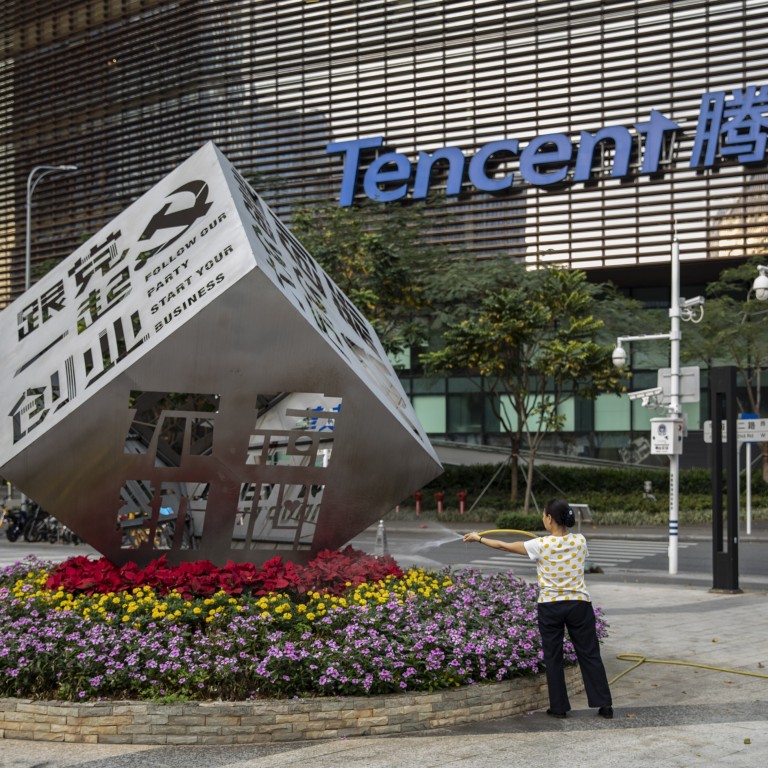
Another Tencent bear emerges as competition clouds earnings while regulatory concerns are still playing out
- Yang at Blue Lotus Capital becomes the second bear on Tencent since Muhl at DZ Bank downgraded the stock to a sell in August
- Analysts have trimmed their price targets for Tencent shares by 21 per cent over the past six months, as company readies its third-quarter report
Shawn Yang Zixiao, deputy research head and a managing director at Blue Lotus Capital Group in Hong Kong, cut his rating to “sell” on the WeChat operator and maker of PUBG online games on October 19, after downgrading it to “hold” on June 29. In that 19-week span, the stock slumped by 21 per cent.
How Tencent missed its chance to join the trillion-dollar club: a brief history
“Tencent is facing increasing near-term pressure, its strengths lie in its traffic which is what its business model is based on,” Yang said in an interview. “It has been losing its dominant position due to competition from ByteDance. Several of Tencent’s key advertisers are showing weakness in the second half of the year.”
Blue Lotus is a boutique investment bank founded in 2015, focusing on China’s internet and new economy sector. It has offices in New York, Hong Kong and mainland Chinese cities of Shanghai, Shenzhen and Wuhan, according to its website.
Investors will get another look at how the company is doing when the Shenzhen-based company delivers its third-quarter report card on Wednesday. The stock has struggled to advance on Tuesday, with earnings expected to be only 0.5 per cent better than a year earlier, based on consensus estimates of analysts tracked by Bloomberg.
To explain the lethargy, he said major carmakers are trimming their advertising spending because of disruptions in chip supply, according to Yang’s report. Real estate, online gaming and online education firms are doing the same because of the uncertain regulatory landscape.

09:40
Tightened regulations among key trends shaping China’s internet in 2021
Yang has a price target of HK$446 for Tencent shares, compared with the consensus of HK$625.74 by analysts who follow the stock. Despite a seemingly bullish upside of 35 per cent, the analysts have slashed their price target by 21 per cent from HK$788.69 over the past six months. There are 62 buy calls, six hold recommendations and two sell ratings on the stock, according to Bloomberg data.
The bearish take on Tencent contradicts some of the views adopted by money managers who have rushed back into Chinese tech juggernauts by betting on an imminent end to the crackdown. That optimism appears to be mistimed following some of the steepest losses in the third quarter.
From BlackRock to JPMorgan, China stock funds bleed with mistimed optimism on tech
“Although Chinese equities have suffered from the various regulatory crackdowns, valuations are significantly discounted in our view,” Soo Hai Lim and William Fong at Barings wrote in a November report on its website. “The recent regulations look likely to foster a more positive environment for long-term sustainable growth in China.”

03:22
Crackdown on private tutoring leaves industry, students and parents drawing a blank
UBS Group, HSBC and Nomura raised their recommendation on Chinese equities last month, arguing that much of the regulatory risks have already been priced in. Yang said policy tightening in the industry has yet to run its full course.
“About 70 to 80 per cent of the regulatory measures are over,” Yang said. “This quarter, we are now gradually entering a stage where regulations are the new normal. Some investors are noticing that and are returning to the Chinese technology sector.”
For investors who would like to buy Tencent, “we suggest [waiting] until all the negative factors are priced in”.

